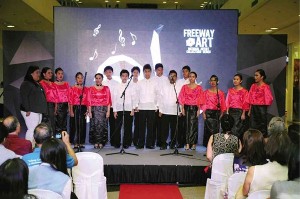If all that Lucio San Pedro wrote was “Sa Ugoy ng Duyan,” a song about a mother’s love, he would have had no problem in securing his place in the hearts and minds of Filipinos.
But San Pedro was more than a one-hit wonder. He earned his place as a National Artist with scores of memorable compositions, most of them about patriotism and love of country that uplift the Filipino spirit.
As the nation marks his 100th birth anniversary this year, San Pedro is honored not just by having his works showcased once again. He is also being celebrated through a clothing line Freeway unveiled recently, the ninth in its National Artist Collector’s Series.
Appropriately, the launch, hosted by singer Rachel Alejandro, was a musical event that featured the ARS Noveau Chorale of Angono Rizal Lead School for the Arts.
Under the direction of Mary Grace Intalan, a granddaughter of the master, the chorale sang a medley of San Pedro’s works that included such popular pieces as “Piliin Mo ang Pilipinas,” “Kayumangging Malaya” and, of course, “Sa Ugoy ng Duyan.”
The San Pedro apparel line follows the collection honoring Carlos “Botong” Francisco, whose centenary was also marked recently. Both San Pedro and Botong were from Angono, birthplace of many of the country’s celebrated artists. They were, in fact, “kumpadres.”
Pinoy pride
In launching the new collection, Sheree Roxas-Chua Gotuaco, chief executive officer of Elite Garments International, Freeway’s mother company, stressed once again the rationale behind the National Artist Collector’s Series that she started in 2009.
Katy Roxas-Chua Qua (left) with Freeway Art Bag design contest winners Christine Sioco and Kevin Roque
“There is so much Filipino talent that we should be proud of,” she said.
Freeway wants to introduce the young to another of the country’s national treasures, the genius behind a classic that has become almost every Filipino mother’s anthem. The song “Ugoy ng Duyan” is actually a collaboration between two National Artists, composer San Pedro and lyricist Levi Celerio.
In a documentary presented during the launch, San Pedro was shown saying in Filipino: “My mother’s style of lulling us (her children) to sleep, those sweet nothings, was etched in my mind, in the year 1943, to be exact.” Who would have thought that the rhythmic pattern his mother invented would turn into a song that would stand the test of time?
San Pedro grew up in a family of musicians and drew inspiration from the beauty of nature and the things around him in Angono. In his music, he extols God and hails the Filipino spirit.
Even as a student at Juilliard, the famed music school in New York, his compositions remained deeply spiritual and distinctly Filipino.
In his desire to impress upon his professor the fact that he was from the Philippines, San Pedro said in the documentary, his first compositions at Juilliard conveyed “a sense of melancholy, a longing for home.”
Music critic Antonio Hila, who called San Pedro a “creative nationalist,” said the National Artist wanted to be relevant to his people by using a musical language that came from the people.
Advised by a Juilliard mentor that if he really wanted to be Filipino in his music, he could get the gist of a folk song and put his personality in it, San Pedro did exactly that.
“When you listen to his songs, the folk essence is there,” said Hila.
Some of San Pedro’s remarkable works are “Suite Pastorale,” “Lahing Kayumanggi” and “Dance of the Fairies.” He was also the musical genius behind choral groups’ favorite Christmas song, “Simbang Gabi.”
San Pedro, who taught composition at several universities and conservatories such as Ateneo de Manila University, Centro Escolar University and the University of the Philippines, preferred his works to be sung not by foreign artists or popular celebrities but by the people of Angono, his daughter Khristy San Pedro Salita said.
She said that all the choir teachers in the town were inspired by her father’s music, which they taught to chorales.
Choir favorite
But even outside Angono, Hila said “it is hard to find a choir in the country that does not have a San Pedro composition” in its repertoire.
Young Filipino artists also continue to popularize San Pedro’s music. Former child star Aiza Seguerra, now a musician, has introduced “Sa Ugoy ng Duyan” to her fans. Hila said “Simbang Gabi” is sung every year at the start of the dawn Masses.
“Maestro was not only an ardent nationalist,” said Hila, “he was also deeply religious and spiritual. If he glorified the country, more so the Creator!”
San Pedro’s eldest daughter, Rhodora San Pedro de los Santos, remembered her father telling nuns and priests in their hometown: “Pray that I live long so I can write more songs for you.”
Hila said that although the works of the master, who passed on 11 years ago, would cease to become his personal possession, they would always remain national property.
The San Pedro family said the Freeway collection was more than a tribute to the National Artist. It was a grand gesture to keep the maestro’s music and memory alive throughout the country.
Freeway’s San Pedro line features a wide array of casual and work tops, as well as tailored dresses bearing the lyrics of San Pedro’s works. Colors range from basic black and white to subtle tones like beige and teal.
The collection combines floral inspirations with curves and hand-drawn lines to honor and represent the maestro’s classical and lyrical legacy.
Freeway shops are located in all major shopping malls throughout the country.
